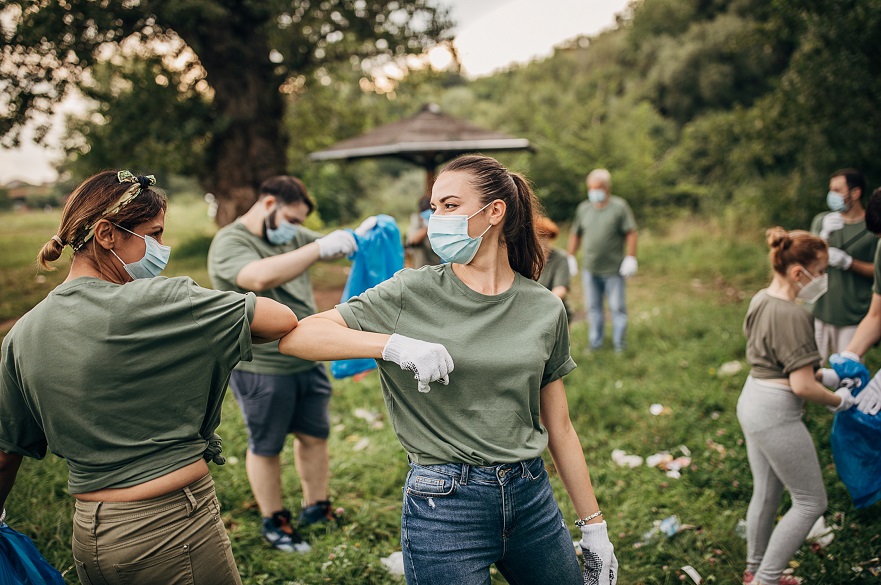Project to measure the ‘temperature’ of the voluntary sector during the pandemic highlights diverse and complex experiences
A two-year study which took the monthly ‘temperature’ of the voluntary, community and social enterprise sector throughout the pandemic has concluded, after highlighting the diverse and complex experiences of organisations across the sector.
By Helen Breese | Published on 22 March 2022
Categories: Press office; Research; Nottingham Business School;

Researchers from Nottingham Business School (NBS), part of Nottingham Trent University, worked with the National Council for Voluntary Organisations (NCVO) and Sheffield Hallam University to carry out 14 waves of a barometer survey, four waves of a panel survey and more than 300 in-depth interviews.
The findings of the Respond, Recover, Reset project revealed devastating results for some organisations, which experienced loss of income, staff, volunteers, and projects in ways that they will struggle to rebuild.
However, others thrived through new services, ways of working, stronger relationships, new-found confidence and, in some cases, stronger and more resilient organisations.
Daniel King, Professor of Organisational Behaviour at NBS and project lead, said: “One of the key stories was of increasing demand for services and falling finances. It was only through flexible and emergency funding that some organisations managed to survive and although confidence has grown, many still feel vulnerable.
“This increasing demand and financial pressure also brought wellbeing to the fore, and a focus on the welfare of leaders, staff and volunteers will continue to be important beyond the pandemic.”
Other key themes included a shift to digital working practices, with more than half of the organisations surveyed reporting an improvement in digital capabilities, and working more closely with others across the sector to respond to the needs of communities.
Volunteering practices also came under the spotlight. While many people had to step back from volunteering during Covid-19, some organisations were able to attract new volunteers who could be matched with new digital or remote roles.
Professor King added: “The pandemic was a disruptor, accelerator, connector, and transformer, changing many aspects of organisational life. For many organisations Covid-19 sped up existing plans by five or 10 years, forcing change, particularly around the use of digital and remote working.
“It also highlighted existing strengths and weaknesses in individual organisations and the VCSE sector as a whole. Some of the shifts will be temporary, simply changes to get through a difficult situation. But other changes will have more long-lasting impacts, exposing organisations to new ways of doing things, questioning existing practices, and broadening horizons and possibilities.”
The project was funded by the Economic and Social Research Council (ESRC). Read more about the findings on the NCVO blog and read the full report online.
Notes for Editors
About Nottingham Business School at Nottingham Trent University
Nottingham Business School (NBS) at Nottingham Trent University (NTU) is a leader in experiential learning and personalisation of business, management and economics education and research, combining academic excellence with positive impact on people, business and society. NBS has an unrivalled level of engagement with business, public and voluntary organisations. With more than 6,000 students, NBS is also one of UK’s largest business schools.
NBS is accredited by EQUIS and AACSB, which are internationally recognised hallmarks of excellence and quality for business education. The School is one of only six UK business schools recognised as a PRME Champion and held up as an exemplar by the United Nations Principles of Responsible Management Education (PRME).
About Nottingham Trent University
Nottingham Trent University (NTU) received the Queens Anniversary Prize for Higher and Further Education in 2021 for cultural heritage science research. It is the second time that NTU has been bestowed the honour of receiving a Queen’s Anniversary Prize for its research, the first being in 2015 for leading-edge research on the safety and security of global citizens.
NTU was awarded Outstanding Support for Students 2020 (Times Higher Education Awards). It was the University of the Year 2019 (Guardian University Awards, UK Social Mobility Awards), Modern University of the Year 2018 (Times and Sunday Times Good University Guide) and University of the Year 2017 (Times Higher Education Awards).
NTU is one of the UK’s largest universities, with over 33,000 students and more than 4,000 staff located across five campuses. It has an international student population of 4,000 and an NTU community representing around 160 countries.
In the past 15 years, NTU has invested £450 million in tools, technology and facilities.
NTU is in the UK’s top 10 for number of applications and ranked first for accepted offers (2019 UCAS UG acceptance data) It is also among the UK’s top five recruiters of students from disadvantaged backgrounds.
75% of NTU students go on to graduate-level employment or graduate-entry education / training within fifteen months of graduating (Guardian University Guide 2021).
NTU is 4th globally (and 3rd in the UK) for sustainability in the 2021 UI Green Metric University World Rankings (out of more than 900 participating universities).